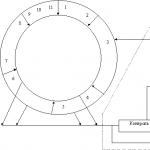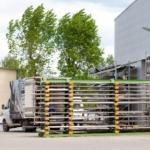Pottery as a business. How to open a pottery workshop. Required starting capital
Attachments: from 135,000 rubles
Payback: from 4 months
An excellent option for a budding entrepreneur with creative potential would be to open his own pottery workshop. This, at first glance, non-obvious idea can be a worthy object for investing effort, money and time. How to implement this project, you will learn from this article.
Business concept
Ceramics have been a companion of our everyday life since time immemorial and to this day do not go out of fashion. And the growing popularity hand made products makes it even more relevant. Clay products can be very diverse - purely utilitarian or exclusively decorative. Dishes made on a pottery wheel: jugs, plates, mugs, dishes, etc. can be used for their intended purpose or as decoration. You can make souvenirs, jewelry, decorative tiles, photo frames and much more from clay. Although there is a fairly large assortment, there is a lack of potential buyers will not be. There are also many options for selling products. You can sell products in bulk for subsequent sale through stores, make products to order, and put them up for sale in various souvenir shops. It is also possible to sell goods directly to customers - directly in the workshop or through your own shop or shop.
Various kinds of master classes, including those on making ceramic products, are quite popular these days. Equipping your workshop additional tools and pottery wheels, as well as providing sufficient advertising to attract clients, it is quite possible to organize classes for everyone.
What will be required for implementation?
You will need a suitable room for work. It shouldn't be big, but it should be able to accommodate everything. necessary equipment, materials and finished products. If you plan to conduct courses and master classes, you should choose a room with a convenient location, and also equip it with additional furniture and equipment.
The main tools will be Potter's wheel, a machine for mixing clay, scales and, perhaps, the most expensive element - an oven for firing products. Finding material for modeling - clay - is not difficult.
There are pottery wheels various designs(hand, foot, table, floor, mechanical, electric). Each master selects a circle individually, based on personal preferences and convenience.
For the production of standard products, for example, souvenir magnets, it is convenient to use ready-made molds. This will speed up the process and produce identical, neat products.

At the initial stage, the entrepreneur himself can work in the workshop alone or with one assistant. While the amount of work is small, it is quite possible to combine production and organizational work. However, as the business develops and the volume of work increases, additional staff will be required.
In no case should you neglect advertising. As in any other business, it is the engine of trade. The more potential clients and customers learn about the workshop, the greater the likelihood of success. One of the most effective channels today is the Internet. You can organize your own website and online store or use the services of existing resources.
For legalization entrepreneurial activity of this kind it is advisable to open an individual entrepreneur.
Step-by-step launch instructions
- Market analysis, study of competitors, demand for products, possible sales options.
- Drawing up a business plan and searching for financing.
- Registration of individual entrepreneurs.
- Search and rental of premises (repairs, if necessary).
- Selection and purchase of furniture and equipment, tools.
- Search for suppliers of raw materials and purchase of the first batch of working material.
- Advertising and promotion of a business project.

Financial calculations
A pottery workshop is a business that requires investment. An entrepreneur cannot do without initial costs, because... funds will be required to rent premises, purchase equipment and materials for work.
The amount of start-up costs for each individual project will differ depending on the scale of the activity. As an example, consider the option of a small pottery workshop in which an entrepreneur works independently.
Start-up capital
The initial investment amount will include:
- rental of premises – from 20 thousand rubles per month;
- pottery wheel - from 30 thousand rubles;
- furnace for firing products - from 40 thousand rubles;
- clay mixing machine - from 30 thousand rubles;
- scales – from 5 thousand rubles;
- advertising – about 10 thousand rubles.
In total, the minimum amount required to open your own small pottery workshop will be 135 thousand rubles.
Monthly expenses
Monthly expenses will include rental payments for premises and advertising costs, which in total will amount to about 30 thousand rubles.
Payback period
The pottery business can pay off within 4-5 months.
Business Features
Opening a pottery workshop is one of those cases when a simple hobby can develop into your own financially successful project.
This type of activity is ideal for people who are passionate about working with clay. Otherwise, you will have to first master this craft or immediately hire professional craftsmen.
Simply producing clay products is not enough. It is necessary to first find out which of them will be in demand, otherwise the entrepreneur risks being left with unsold goods. The best option is to work on a pre-order basis.
Bottom line
Own pottery workshop is a good option for a beginning entrepreneur, allowing him to realize his creative potential and receive stable income. The risks accompanying such a business are minimal, and relatively small amounts of financial costs allow you to start operating almost immediately.
Many of us have our own hobbies. Usually these activities bring only moral satisfaction. But who said that a hobby cannot be profitable? Exactly to this profitable type activities include pottery art. How much will it cost to open a small pottery workshop? And how much can you earn by turning a pottery wheel?
Main material the potter works with is clay. It comes in different varieties and is selected depending on the product being manufactured.
Technological processes of pottery production – this is kneading, modeling and firing. In the future, the finished product can be coated with glaze.
Making one ceramic pot can take about two hours. In this case, 20-30 minutes will be spent on kneading and modeling clay, and the rest of the time on drying and firing.
Every job has its own nuances. In pottery, the total percentage of defects reaches 20-30%, and at first it can amount to half of all clay pots. The degree of suitability of the raw materials, clay modeling, the level of dryness before firing - all this affects the quality finished products. If you intend to rotate the pottery wheel yourself, then you will have to master all the processes and understand everything technological details. Also, to make pottery or souvenirs, you must have artistic taste and imagination.
Composition of pottery workshop equipment
includes
- muffle furnace - preferably 3-4 pieces. The price is about 100 thousand rubles;
– pottery wheel – quantity depends on the number hired workers. The price is 30-50 thousand rubles. But there are ways to make a pottery wheel with your own hands;
— clay mixing machine – price about 30 thousand rubles;
— scales – price about 6 thousand rubles;
- molds for products - quantity as required.
The composition of the premises of the pottery workshop consists of a production area and a warehouse. It is better to carry out the glazing process in a separate room with good ventilation. The glaze contains lead and other chemical elements, so you must take your own safety precautions.
Area of premises is selected depending on the volume of production and the number of workers. Minimum industrial volumes require at least 50 sq.m. production space, with about 20 sq.m. allocated for storage. The rent for such premises will be about 30-40 thousand rubles. per month.
Pottery activity workshop falls under OKVED code 26.21 “Production of household and decorative ceramic products.” This category includes the production of dishes, household items made of ceramics, as well as figurines and other decorative items. However, the production of toys is not included in this group. If you plan to produce such products, then during registration you must add OKVED code 36.50 “Other production”. Number of recorded species economic activity should be maximum and include all possible productions.
When registering an activity, it is better to choose an individual entrepreneur under the simplified taxation system as an organizational and legal form. This will reduce tax payments and insurance premiums.
Number of workshop staff directly depends on sales volumes. As a rule, pottery is practiced by people who are in love with their craft. And there are not many of them. In addition, pottery and souvenirs are exclusive works of authorship. Finding customers and organizing sales is a very labor-intensive process. Typically, craftsmen export their products to places with a large flow of foreign tourists, to various festivals and exhibitions, closer to Europe. Where clay pots and hand-made jars are in demand. Therefore, the staff in a small pottery workshop consists of 1-2 people.
Sales establishment - the most crucial moment in the entire pottery business. Despite the fact that sales volumes of souvenirs have increased significantly in recent years, 90% of all products are produced outside of Russia. In any case, traders import their goods from Southeast Asia. This means that this market is still free for domestic producers.
According to wholesalers, Russian manufacturers are very unreliable in terms of timing and quality of their products. For a large souvenir chain, the minimum batch of products of one name must be at least 1000 pieces. Therefore, when concluding a contract with such a customer, there are very large risks for the supplier.
Arrangements with small souvenir shops are more attractive for a small pottery studio. The volumes are smaller, but the income is correspondingly smaller.
One of the implementation options is the production of custom-made products. For example, when designing interiors, many people look for special vases, clay pots or reliefs, tiles or frames. Fridge magnets, small stationery stands, clay figurines, and beer mugs work well as promotional souvenirs.
Development pottery business In addition to selling finished products, it also involves establishing a training program pottery. Organizing master classes or training courses can be a good source of income. There has always been an interest in this type of art. Rotating a potter's wheel and watching a piece of clay transform into a slender vase or jug is truly a pleasure. Therefore, there are quite a few people willing to try it. Moreover, in Lately, pottery therapy has become very popular. By the way, master classes can be held at the customer’s home. And, as customers, elite schools and kindergartens can act here.
Advertising of products and services – this is an element of promoting any business, including pottery. In order to be noticed and appreciated, you will have to spend heavily on advertising. But, as they say, the end justifies the means.
Cost of clay products ranges from 100 to 1000 rubles. a piece. The price depends on the volume, shape, design, complexity of the work. Souvenirs and magnets range in price from 40 to 100 rubles.
Cost of education can vary from 300 to 1000 rubles per hour. It all depends on the professionalism of the master and the availability of those willing to pay a certain amount.
To summarize all of the above, we can characterize the business model of an ideal pottery workshop, which works in three directions at once: 1) production of clay products for large wholesalers; 2) a separate small workshop for the production of custom works; 3) a school for teaching pottery. The head of this enterprise is himself individual entrepreneur and exercises direct control over the quality of manufactured products and delivery times.
As for the initial investment, as you can see, it is small. Opening a workshop and promotion will cost no more than 10 thousand dollars. But the payback period and the amount of profit will depend on the creativity and organizational abilities of the entrepreneur himself.
Any creative person sooner or later he thinks about changing his boring office job to one that will delight his soul. Various ideas come to mind, from drawing to organizing holidays. For many, it is important that their business is ethical and brings real benefits to society. One of these is learning an ancient craft - pottery art.
Clay is a pure natural material, which, on the one hand, allows you to relax and escape from routine. On the other hand, clay has been an excellent material for construction and various industries since ancient times. Bricks, dishes and decorative items are still made from clay. ceramic products. Expensive porcelain and earthenware are also made from clay in a process not unlike making bricks. The difference in production lies only in the type of clay and some specific final processes. Despite the antiquity of pottery, it is still relevant. And with the increased availability of tools, it has become popular among ordinary people who want to make ceramics for themselves and friends, as a hobby. Therefore, the business of training and providing the opportunity to engage in this wonderful activity will always find its consumer.
Why pottery school?
Agree, everyone loved to sculpt from plasticine in childhood, and some were lucky to work with the purest natural material- clay. By itself, clay is a viscous substance that is easily susceptible to plastic changes. Clay is used to make dishes, decorative interior items, jewelry and much more. But learning to sculpt something worthwhile from clay yourself is quite difficult. This is why people willingly sign up for master classes on modeling clay with their hands and on a pottery wheel.
Both children and older adult couples come to classes. Clay modeling calms, clears the mind and gives a positive outlook for the whole day. In addition, the products received after classes can be fully used in everyday life. Some compare the process of sculpting with clay to meditation. Group classes are also in great demand as an excellent form for a birthday or corporate event.
Where to begin?
Many people think that in order to open a pottery school, you need to be very good at sculpting with clay. Partially this is true. You must have at least two specialists on your staff who understand pottery, preferably one of them is a ceramic designer, trained in a special educational institution. It is important to understand that after your students make clay products, you will need to dry them yourself and fire them at the right temperature. Also don't forget about technological processes: glazing of products (glazing), painting with engobes, waste and secondary firing.

Of course, if you do not want to teach courses yourself, then you should entrust control of these important components of the business to your employees. But in reality, these processes are not that complicated, but, of course, it is better to hire an experienced specialist in this field for the first time in order to adopt his experience and create your own technological manual. As for the modeling itself, there is nothing complicated here. You can create a training program in literally a week. Study the literature on pottery art on your own and for the first time this will be enough for children and beginning ceramists.
Some subtleties and tips on equipment and opening your own pottery school
To get started you will need:
- clay kiln
- Potter's wheel
- set of tools (brushes and special devices)
- furniture and shelving
- clay and paints
The business of opening a pottery school has a low barrier to entry. First, you will need to purchase a kiln; its price starts from 90,000 rubles. For the first time, the simplest stove will be enough. Please note that it is important that the kiln can fire clay at temperatures above 1000 degrees. You will also need the clay itself, tools and special paints for it (engobes and glazes). Don't forget about the potter's wheel, it will be indispensable if you want to start learning how to make tableware, although at first, classes can only be conducted on hand modeling. All this can be purchased in specialized online stores.

An important expense will be the purchase of furniture to organize a workspace in a pottery school. It all depends on the area of the room. Minimum purchase for organizing a pottery school from secondary throughput about 100 people per month – 150,000 rubles, excluding premises rental.
The area of the room must be at least 30 square meters, but keep in mind that the larger the room, the more comfortable it is for the students. Try to locate yourself closer to schools and kindergartens, preferably in the city center, so that it is convenient to get to the workshop.
Select a special place for the furnace (this will be an electric muffle furnace), take into account the requirements fire safety, consult with specialists who produce clay kilns.
Training formats can be:
- — single master classes on hand modeling or on a pottery wheel (for everyone)
- — basic course, consisting of 8-12 lessons (for those who want to learn modeling)
- — narrowly focused classes for professionals in their field (advanced courses, advanced training)
- — rental of workspace for advanced potters and individual classes (pottery coworking)
What can you expect in the end?
The payback for such a business is approximately 6-8 months, it all depends on advertising and proper positioning in your city. At the start, it is very important to attract students with friendly service and a flexible pricing system. Average check for a master class can reach 2000 rubles per listener.
Design is important to the image of a pottery school, so pay attention Special attention, both in name and external design. Pottery school attracts both children and parents with its creative process. As a rule, no one remains indifferent, because clay modeling is a wonderful way of self-expression that will always be in demand in the service market.
Do you want to open own business, but don’t have serious funds to invest? It doesn’t matter - you can always find a niche where you don’t need a serious start-up capital, but at the same time the business brings good profit. One of these niches iswhich we will talk about in this article. Its organization does not require anything supernatural or complicated - anyone can open it.
Introduction
Clay products are still popular, despite the fact that more practical and reliable materials are available on sale. Today, pottery is used mainly as souvenirs - in any store you can find plates, vases, cups, toys, tablets, frames and other clay products. They are very popular among buyers and demand, as a rule, greatly exceeds supply.
Pottery - good business for beginners
Why do you need a workshop if you can produce products in an apartment? In principle, at the initial stage you can easily organize production in a garage or office, but if we're talking about specifically about business, then you should still think about legalization and a separate premises. You will need equipment, tables for drying, you will be able to organize excursions for children, conduct master classes, which will significantly expand the number of your clients and will be a good tool for marketing.
How to start
Before starting any type of business, you must:
- Study the market. Go around the souvenir shops in your city, see what they offer and at what price. Try to find manufacturers and ask them for their selling prices.
- Create a buyer profile. Your clients will be tourists aged from 22 to 50 years old, as well as teenagers aged from 8 to 14 years old who will attend master classes.
- Study manufacturing technology. There is nothing complicated about this - on YouTube you will find hundreds of videos on how to make certain types of pottery.
- Find a place. Let's say right away - the apartment is not suitable. In principle, if you have your own home, you can equip a barn or garage for this, but keep in mind that groups of people will come to you. Usually the equipment is installed in the yard.
- Create a business plan. Many new entrepreneurs skip this step. We do not recommend doing this - firstly, you will be able to collect all your thoughts and ideas into one whole, and secondly, it will be like a reminder for you about where you wanted to move and what to achieve.
- Register with the tax authorities. Registration - important stage legalization. If you want to provide services and sell products, then don't miss it.
- Start working. Once the premises are found, you purchase equipment and raw materials, and then get down to business. We recommend that you first focus on souvenirs to get a constant flow of money, and then organize excursions.
As you can see, there is nothing supernatural in this regard - with the proper desire and desire, you can open a workshop in a couple of weeks.
How to register
To register you need to contact tax office at your place of residence. You can choose a work system - an individual entrepreneur or a company with limited liability. For a potter, the first option is quite sufficient.
Attention:Forming an individual entrepreneur is much easier and cheaper than registering an LLC. Reporting for an individual entrepreneur is also simpler, so we recommend choosing him.
When registering, you should select OKVED codes:
- 2, section C - manufacturing.
- 23 - production of non-metallic products.
- 23.4 - manufacture of other ceramic products.
- 23.41 - production of decorative and household items from ceramics.
In principle, the above is quite sufficient for work, but if necessary, you can specify retail trade, and provision of consulting services. In principle, the number of OKVED codes is unlimited, so enter them without fear. But if you want to do something that is not included in the codes during registration, you will have to contact the tax office again, so it is better to indicate them in advance.

There is nothing complicated about pottery art
Since your business is guaranteed to employ less than 5 people, you can choose a simplified work system, which will allow you to refuse to fill out tax returns and do accounting.
Selection of premises
For work you need a room of 50 m2. This is quite enough to accommodate equipment for pottery workshop and a small warehouse (at least 15 m2 is recommended).
Attention:choose a room on the ground floor to make it easier for you to take out finished products and bring in raw materials. Also keep in mind that you will have visitors.
Where to choose a room? You don’t need central streets with hypermarkets, where rent is very expensive; a residential area or even the outskirts of the city near a transport interchange are quite suitable for you. The requirements for the premises are simple: sufficient volume, water supply, electricity and heating. It is advisable that there is ventilation in it (since the room will be damp), but in extreme cases, regular ventilation can be organized. There is no need for special renovations in the room - just plaster the walls or leave the brick - it looks good in the interiors.
We select equipment
So, we have already decided on the main issues. Next, let's look at what equipment you will need for work:
- High quality pottery wheel. They are available with a foot drive and a motor. We recommend purchasing modern motor options so as not to be distracted while working.
- Scales for weighing raw materials and finished products. Usually you need two scales - one measuring in grams (from 1 to 3000 grams) and the second, measuring in hundreds of grams.
- A machine that allows you to knead clay. Of course, this can be done manually, but this will require spending time and effort, and it will not be possible to knead large volumes of quality by hand.
- A special kiln for firing, with the help of which the products are dried and brought to condition. A classic oven will not work - you need a special temperature regime.
- Various molds for making figurines and other things.
- A set of brushes and special paints for ceramics.
At 2018 prices, you will spend about 300 thousand rubles on purchasing equipment and processing all documents. This is quite an affordable amount to start your own business.
Attention:if you are limited in funds, you can always purchase used equipment - this will reduce costs by about 30%.
Organizational matters
You need to immediately decide who exactly will work in the workshop. In principle, to begin with, you can do this yourself to master the process and learn all its tricks. But then we recommend hiring people, since making souvenirs will take as much time as possible. You will need at least two people - one to mix and shape the clay, and the other to handle artistic painting. You can take on the responsibilities of a manager, selling goods and organizing various events.

By conducting master classes, you will attract new clients
The manufacturing technology is quite simple:
- The required amount of clay is poured with a certain amount of water, the solution is kneaded in a machine until a homogeneous mass is obtained. It is very important to achieve uniformity and the absence of lumps so that the product does not have defects.
- Giving the clay the required shape. Some of the clay is placed in molds, and some is sent to the potter's wheel for processing. The resulting product is dried so that it can be transferred to the oven.
- Firing of finished products. It is placed in the oven and kept at a certain temperature. During the firing process, the clay crystallizes and turns into ceramics - a dense and durable material that is not afraid of moisture.
- After the product has cooled, it is sent to the artist’s table. He colors it, giving it unique features. In some cases, special paints are used that must be baked to obtain a glazed surface.
How much can you earn
Next we move on to the most interesting part - financial matters. You already know what is needed to organize a workshop, what equipment is needed, what exactly is produced and how ceramics are made. Now let’s look at how quickly the investment will pay off.
It is best to sell your goods in bulk, handing them over to souvenir shops. They usually work as a network, so you need to reach out to the owner and get him interested by offering profitable terms. Consider what networks need a large number of products - they sell tens and hundreds of products a day.
Second source of profit - training courses and master classes. Most parents will be happy to enroll their child in pottery workshop for children for creative courses, and regular visits from groups bring good profits. You need to think in advance about exactly how you will work, because working with children requires a special person, so you will either have to do this yourself or expand your staff.
Don't forget about large companies who often order souvenirs for the entire team - by receiving contracts for such transactions, you can provide yourself with work for several weeks. In this article we will not give exact numbers, since they simply do not exist - it all depends on your desire, location, products and correct organization. Let's just name general figures for business - on average, a workshop working one shift brings in at least 3 thousand rubles per day net profit minus the costs of raw materials, rent and salaries. You will earn about 90 thousand per month, recouping your investments in 4-5 months (it should be borne in mind that you are unlikely to reach this amount right away). Practice shows that six months after opening, workshops are firmly on their feet and expanding, launching new product lines, organizing various courses and clubs, attracting visitors to master classes and lessons.






